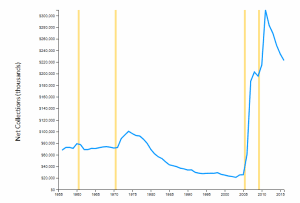The economic crisis caused by the coronavirus pandemic poses a triple challenge for tax policy in the United States. Lawmakers are tasked with crafting a policy response that will accelerate the economic recovery, reduce the mounting deficit, and protect the most vulnerable.
To assist lawmakers in navigating the challenge, and to help the American public understand the tax changes being proposed, the Tax Foundation’s Center for Federal Tax Policy modeled how 70 potential changes to the tax code would affect the U.S. economy, distribution of the tax burden, and federal revenue.
In tax policy there is an ever-present trade-off among how much revenue a tax will raise, who bears the burden of a tax, and what impact a tax will have on economic growth. Armed with the information in our new book, Options for Reforming America’s Tax Code 2.0, policymakers can debate the relative merits and trade-offs of each option to improve the tax code in a post-pandemic world.




Tax Reform Moving Quickly in Georgia
In response to federal tax reform, Georgia is poised to reform its own tax code in a way that would make the state more competitive with its neighbors.
3 min read

Oregon’s Chance to Limit a Flaw in the Federal Tax Code
Senator Hass’s proposal to limit the special pass-through deduction in Oregon is the right choice, protecting the state’s budget, while advancing sound tax policy.
3 min read
Tax Compliance Burden Could Cost America as much as 1.2 Percent of its GDP
The time and effort associated with tax compliance is a drag on the economy, as researchers have shown. Will the Tax Cuts and Jobs Act reduce that burden?
3 min read

